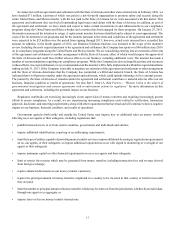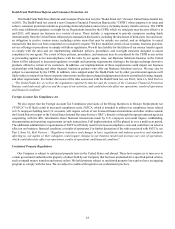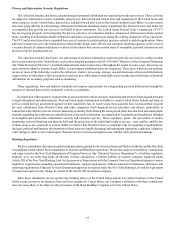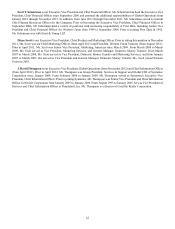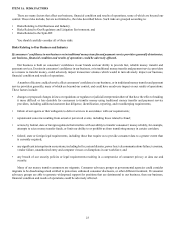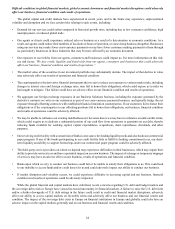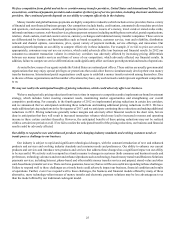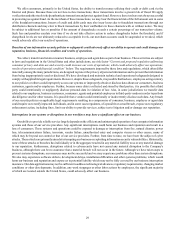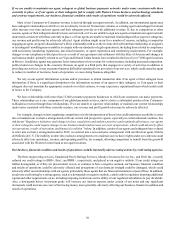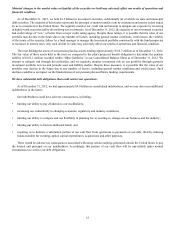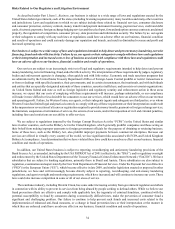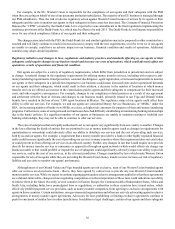Western Union 2012 Annual Report Download - page 32
Download and view the complete annual report
Please find page 32 of the 2012 Western Union annual report below. You can navigate through the pages in the report by either clicking on the pages listed below, or by using the keyword search tool below to find specific information within the annual report.27
Many of our agents outside the United States are post offices, which are usually owned and operated by national governments.
These governments may decide to change the terms under which they allow post offices to offer remittances and other financial
services. For example, governments may decide to separate financial service operations from postal operations, or mandate the
creation or privatization of a “post bank” or they may require multiple service providers in their network. A government could
decide to restrict remittance service to only the national post office. These changes could have an adverse effect on our ability to
distribute, offer or price our services in countries that are material to our business.
Interruptions in migration patterns, including as a result of economic conditions, could adversely affect our business, financial
condition and results of operations.
Our Consumer-to-Consumer money transfer business relies in large part on migration, which brings workers to countries with
greater economic opportunities than those available in their native countries. A significant portion of money transfers are sent by
international migrants. Migration is affected by (among other factors) overall economic conditions, the availability of job
opportunities, changes in immigration laws, and political or other events (such as war, terrorism or health emergencies) that would
make it more difficult for workers to migrate or work abroad. Changes to these factors could adversely affect our remittance volume
and could have an adverse effect on our business, financial condition and results of operations.
Many of our consumers work in industries that may be impacted by deteriorating economic conditions more quickly or
significantly than other industries. Reduced job opportunities, especially in construction, manufacturing, hospitality, agriculture
and retail, or overall weakness in the world's economies could adversely affect the number of money transfer transactions, the
principal amounts transferred and correspondingly our results of operations. If general market softness in the economies of countries
important to migrant workers occurs, our results of operations could be adversely impacted. Additionally, if our consumer
transactions decline, if the amount of money that consumers send per transaction declines, or if migration patterns shift due to
weak or deteriorating economic conditions, our results of operations may be adversely affected.
Acquisitions and integration of new businesses create risks and may affect operating results.
We have acquired and may acquire businesses both inside and outside the United States. The acquisition and integration of
businesses involve a number of risks. The core risks involve valuation (negotiating a fair price for the business based on inherently
limited due diligence) and integration (managing the complex process of integrating the acquired company's people, products and
services, technology and other assets in an effort to realize the projected value of the acquired company and the projected synergies
of the acquisition). In addition, the need in some cases to improve regulatory compliance standards is another risk associated with
acquiring companies, see “Risks Related to Our Regulatory and Litigation Environment” below. Acquisitions often involve
additional or increased risks including, for example:
• managing geographically separated organizations, systems and facilities;
• managing multi-jurisdictional operating, tax and financing structures;
• integrating personnel with diverse business backgrounds and organizational cultures;
• integrating the acquired technologies into our Company;
• realization of anticipated financial benefits from these acquisitions and where necessary, improving internal controls of these
acquired businesses;
• complying with regulatory requirements;
• fluctuations in currency exchange rates;


